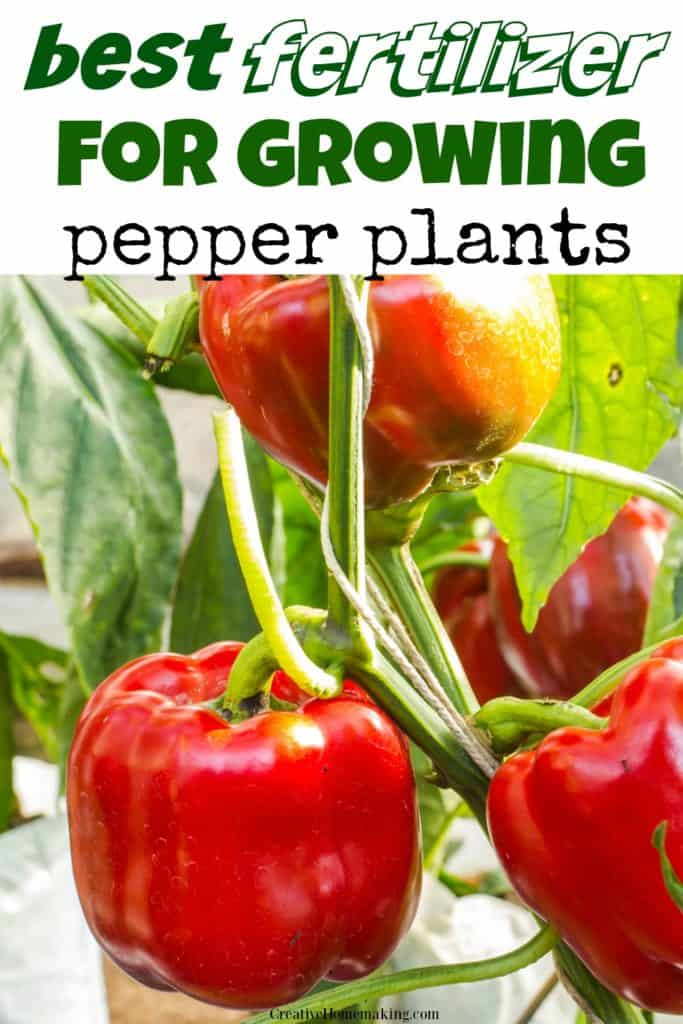Best Fertilizers for Peppers: A Comprehensive Guide to Increase Your Harvest
Best Fertilizers for Peppers: A Comprehensive Guide to Increase Your Harvest
Blog Article
Organic Vs. Synthetic Fertilizers: Which Is Best for Nurturing Healthy Pepper Plants?
In the world of nurturing healthy and balanced pepper plants, the option between organic and synthetic plant foods stands as a critical decision with far-ranging implications. While both alternatives purpose to supply important nutrients to sustain plant development, the nuances of their influence on the dirt, plant health, and the atmosphere trigger an argument that echoes throughout the gardening neighborhood. Understanding the distinct advantages and possible challenges of each fertilizer type is essential for pepper cultivators looking for to enhance their returns while keeping a lasting and eco-conscious technique.
Advantages of Organic Fertilizers
Organic plant foods offer an environmentally-friendly and lasting approach to nourishing pepper plants, giving important nutrients without using artificial chemicals. These natural fertilizers are derived from natural resources such as compost, manure, bone dish, and algae, advertising dirt health and biodiversity. Unlike synthetic fertilizers, organic alternatives launch nutrients gradually, making sure a balanced and constant supply for pepper plants to thrive.
One considerable benefit of natural plant foods is their capability to boost soil framework and water retention. By improving soil health and wellness, organic plant foods promote helpful microbial task, which aids in nutrient uptake by pepper plants. Furthermore, organic plant foods reduce the danger of chemical run-off, protecting water resources from contamination and protecting the setting.
Moreover, organic fertilizers contribute to lasting soil fertility by advertising the growth of helpful soil organisms. These organisms help damage down raw material, launching nutrients in a form that is quickly accessible to pepper plants. best fertilizers for peppers. By promoting a healthy and balanced dirt environment, organic fertilizers support lasting pepper growing techniques that profit both plants and the setting
Downsides of Synthetic Plant Foods
Synthetic fertilizers, in comparison to their natural counterparts, present different negative aspects when made use of to nurture pepper plants, affecting both plant health and wellness and ecological sustainability. One major downside of synthetic plant foods is their propensity to leach nutrients from the soil swiftly.
Moreover, the overuse of artificial fertilizers can add to water air pollution. Excess plant foods not soaked up by plants can clean away right into water bodies, resulting in eutrophication, where algae blossoms deplete oxygen degrees in the water, harming aquatic life. In addition, artificial fertilizers are usually acquired from non-renewable resources, such as nonrenewable fuel sources, adding to carbon emissions and ecological deterioration during their manufacturing.
Nutrient Absorption Comparison
When comparing organic and artificial fertilizers in terms of nutrient absorption, natural plant foods have the advantage of giving an extra balanced and slow-release resource of nutrients. Organic plant foods include a range of macro and trace elements that are not only advantageous for the plants but also advertise healthy and balanced dirt microbial task, which aids in nutrient uptake.
Moreover, organic plant foods enhance soil framework and water retention capability, permitting pepper plants to gain access to nutrients much more effectively. This enhanced soil top quality assists in origin growth, making it possible for better nutrient absorption. Synthetic plant foods, although initially increasing plant development due to their high nutrient concentrations, may prevent lasting nutrient absorption by degrading soil health in time.
Ecological Effect Factors To Consider

On the various other hand, synthetic fertilizers, although commonly more focused and instantly available to plants, can have harmful effects on the environment otherwise used properly (best fertilizers for peppers). Their production calls for high energy inputs, leading to greenhouse gas discharges and adding to environment change. The runoff of excess artificial plant foods can pollute water resources, leading to eutrophication and hurting marine ecosystems.
Finest Plant Food Practices for Peppers
To attain this, it is important to follow ideal plant food practices tailored to the particular requirements of pepper plants. One essential technique is to do a soil examination before applying any kind of plant foods.
An additional crucial practice is to fertilize pepper plants at the best time. Commonly, peppers take advantage of getting fertilizer at growing and then once again when they start to flower. Over-fertilizing can cause nutrient discrepancies and hurt the plants, so it is go to my site vital to adhere to recommended application prices.
Furthermore, selecting a well balanced fertilizer with an NPK proportion that suits pepper plants' demands is fundamental. Organic plant foods, such as compost or manure, can be superb choices as they release nutrients slowly and enhance dirt structure gradually. Synthetic fertilizers can supply a fast nutrient boost when needed. Eventually, combining artificial and natural fertilizers sensibly can assist nurture healthy and balanced pepper plants while decreasing ecological impact.
Verdict

Organic fertilizers provide an environmentally-friendly and lasting technique to beneficial pepper plants, offering essential nutrients without the use of synthetic chemicals. Unlike synthetic plant foods, natural choices release nutrients slowly, ensuring a steady and well balanced supply for pepper plants to thrive.
Synthetic fertilizers, in comparison to their natural equivalents, position numerous downsides when utilized to nourish pepper plants, impacting both plant health and environmental sustainability. here When contrasting natural and artificial fertilizers in terms of nutrient absorption, organic fertilizers have the advantage of offering a much more well balanced and slow-release source of nutrients.In addition, natural plant foods boost soil structure and water retention capability, enabling pepper plants to access nutrients extra efficiently.
Report this page